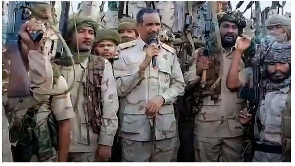The lack of urgency by the Sudanese parties to seek a peaceful settlement may be fuelling more atrocities with human rights groups warning the scale of killings and destruction could reach unprecedented levels.
This week, the Sudan Armed Forces (Saf) said it was no longer participating in talks, dampening hope of resumption of the Jeddah talks arranged by the US and Saudi Arabia governments.
“Talk of an alleged truce is incorrect, and our delegation is still in the country and the negotiations are currently suspended,” Nabil Abdalla, Sudan army spokesman, said in a statement Tuesday, dismissing rumours of a new ceasefire, one of the many signed but broken since April 15.
Sudan’s war, however, is a big toll on humanity itself. And on Thursday, Amnesty International said thousands of people killed and injured since fighting broke out between Rapid Support Forces and Saf signals little regard for international law.
The report says women and girls as young as 12 are subjected to sexual violence.
In all, some 3,000 people have died, and 6,000 others injured.
“Civilians are suffering unimaginable horrors, “Agnes Callamard, of Amnesty International Secretary General said.
Abdullahi Hassan, the Amnesty International Researcher on Sudan and Somalia said that the scale and circumstances of civilian deaths and injuries in the context of the current conflict indicate that the parties to the conflict have been acting in disregard of the most fundamental provisions of humanitarian law.
Hassan says the scale of the civilian harm, over an extended period, indicates that the parties to the conflict are failing to take adequate precautions to protect civilians.
“We call on the ICC to investigate ongoing violations in Darfur region and are asking the State Parties to the ICC to provide additional resources to the court to do this work. Beyond that and in light of the conflict, we ask the Security Council to expand the Darfur conflict referral to the ICC to include investigation and prosecution of crimes committed under international law, in the rest of Sudan”.
Amnesty admits that the international community has failed to adequately respond to the crisis which is why his organisation is asking Sudan’s regional and international partners to act swiftly and with determination to respond to the violations that have been committed and prevent further atrocities.
Those appeals have fallen on deaf ears. The head of Sudan’s junta, Lt-Gen Abdel Fattah al-Burhan maintains that any ceasefire can only be based on the ability of the Jeddah Initiative to persuade the Rapid Support Forces (RSF) led by Gen Mohamed Hamdan “Hemedti” Daglo to implement commitments previously agreed between the two sides.
Hemedti called for the replacement of army leadership if they wanted a quick solution.
Yasir Arman, a prominent leader of the Forces for Freedom and Change (FFC), one of the civilian movements in the country, has opposed the inclusion of members of al-Bashir’s National Congress Party (NCP) in any discussion about the future of Sudan.
Mr Arman — a former member of SPLN-North that contested against al-Bashir in the 2010 elections when the county was one — criticised the African Union (AU) for including the banned NCP members in the discussions set for August 25 at the headquarters in Addis Ababa.
He argued that such a move is to reward the NCP, the Islamists, and their allies for having ignited the war in Sudan, given that Gen al-Burhan — a creation of NCP having rejected all efforts by the Inter-Governmental Authority on Development (Igad) and AU to settle the Sudan crisis.
Since the war broke out on April 15, the whereabouts of al-Bashir and his co-accused remain unknown.
Gen al-Burhan on April 23 released thousands of inmates from Kober Prison for lack of food and security, including Ahmed Haroun, a former Bashir official who is also wanted at the ICC for his role in the atrocities in Darfur from 2003.
But the atrocities continue beyond what al-Bashir did as Sudan sinks into chaos. The Amnesty International report profiles Fawzi al-Mardi and her father, who narrated how his wife was also seriously wounded.
He said, “That morning we woke up to hell. The sound of shooting and bombing was everywhere, relentless… I was worried about my daughter Ala’ who had gone to work at the hospital.
“A few minutes after she had arrived home, a bullet came through the living room window, and it hit my wife in the face. It went through the right side of her face and neck, and then hit Ala’ in the chest, killing her. That single bullet destroyed our family in the space of seconds… As soon as [Ala’] arrived home, where she should have been safe, death came to our home.”
Many civilians told Amnesty International they had been injured and their relatives killed where they sought safety. On June 6, repeated strikes with ground-launched projectiles in West Darfur killed and injured dozens of civilians in and around the El Geneina University female dorms, where many people were sheltering after fleeing fighting in their neighbourhoods.
Africa News of Saturday, 5 August 2023
Source: theeastafrican.co.ke

















